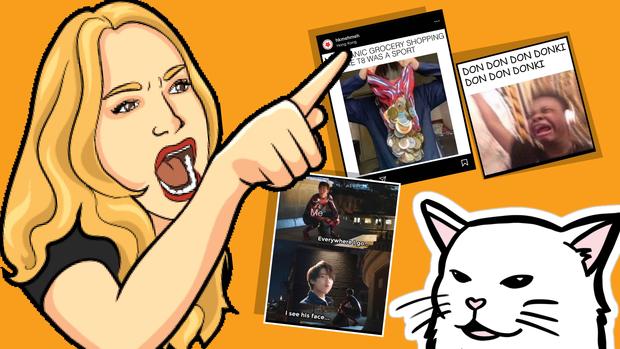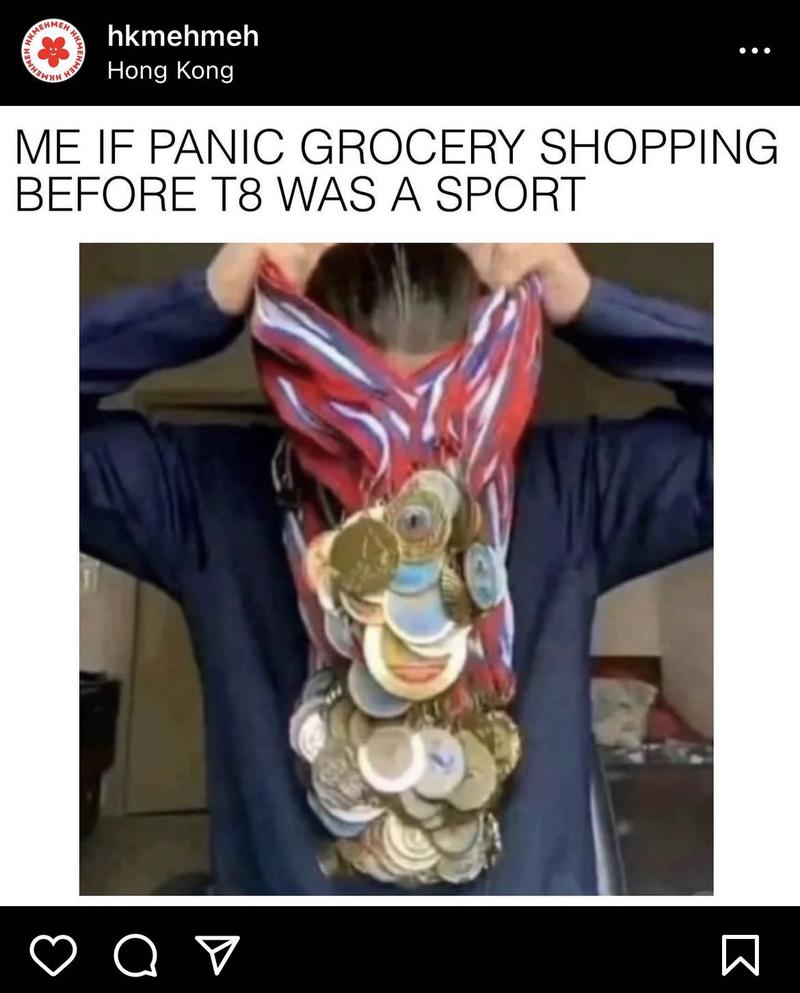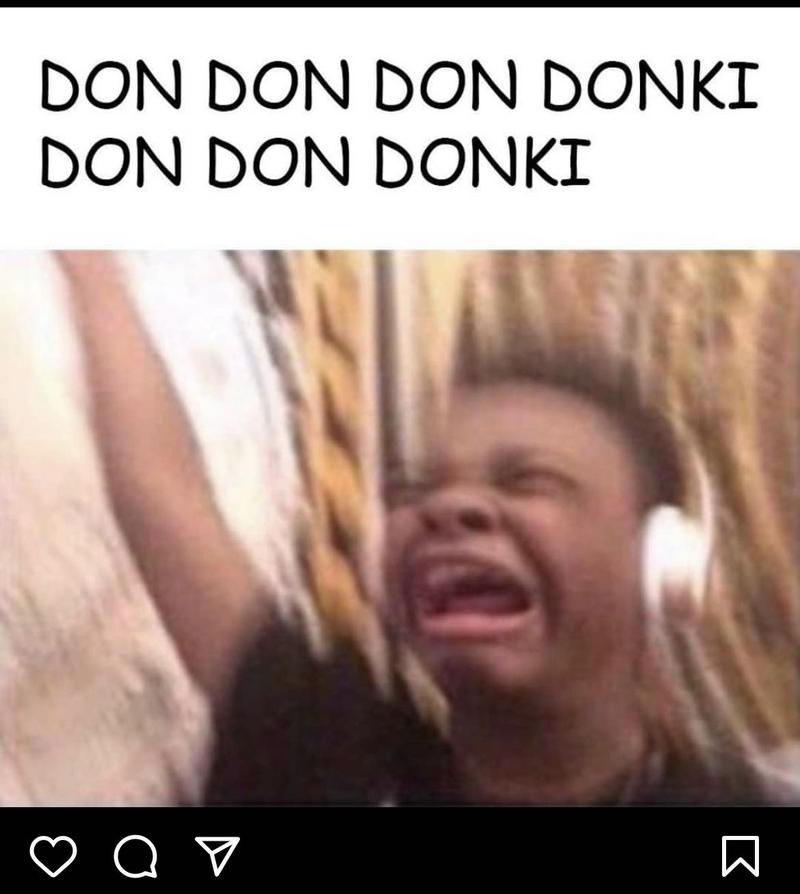Humorous images and texts are popular internet tools for people to cope with stress amid the pandemic, and in nurturing a sense of the collective on social media. But experts say a line should be drawn between the hilarious and the malicious. Wang Yuke reports from Hong Kong.

As COVID-19 continues to upend people’s lives, those cooped up at home or in largely deserted offices may have found solace in memes, which tickle our funny bones and dispel the gloom with a message that we are not alone.
Memes captioned “You may realize 2022 is pronounced as 2020 too” have hit the internet, mocking the stark reality that the coronavirus is still around, while we may shrug it off with a grimace, saying to ourselves: “Well, life isn’t that bad”.
They (memes) are above and beyond traditional media messaging and made by unique individuals. They introduce a feeling of ‘in-group’ messaging. The weirder the meme, the more niche the community.
Jamie Cohen, digital culture expert and author
A meme is defined as an “amusing or interesting item (such as a captioned picture or video) or a genre of items spread widely online, especially through social media”. The term was coined in 1976 by evolutionary biologist Richard Dawkins in his book The Selfish Gene. He used “meme” to describe the propagation of cultural information through replication and mutation, just like genes being passed through generations. It’s fair to say a meme is a cultural equivalent of genes.
We’re spoilt today when we crave fodder just for a hearty laugh. Social media channels constantly bombard us with juicy content. But what makes a meme one of the juiciest genres in content, a zeitgeist phenomenon and an integral part of the tapestry of digital culture?
Maybe it’s the deluge of information exchanged on social media that differentiates memes from other forms of communication, as “memes condense all of these into a very lightweight and transmittable form”, says Anirban Baishya, assistant professor of communication arts at the University of Wisconsin-Madison, who has examined the link between memes and political rhetoric.
Memes have emerged as a highly participatory, sharable and interactive canvas for communication online as everyone can superimpose new captions, images, soundtracks and even videos on them. The easy access to and the ubiquity of photo editing tools “give people permission to break the mold of formats” in tweaking a meme and, therefore, memes have become “more referential” and “layered”, says Jamie Cohen, a digital culture expert and author specializing in memes.
As a meme is replicated and shared, its popularity snowballs. When it gains a sizeable reach, it becomes a thing, such as “doge”. “Replicability is key to memes because replication and copying ensures that the meme (and its attendant ideas) stay afloat in a sea of information,” notes Baishya.
 Screenshots of memes posted on “hkmehmeh”, an Instagram account created by Nancy Lim, that captures peculiar experiences exclusive to Hong Kong. (PHOTO PROVIDED TO CHINA DAILY)
Screenshots of memes posted on “hkmehmeh”, an Instagram account created by Nancy Lim, that captures peculiar experiences exclusive to Hong Kong. (PHOTO PROVIDED TO CHINA DAILY)
Sense of belonging
Memes foster “community” and endorse “collectivism” — they are created to strike a chord among people who can understand them, identify with them, and feel compelled to share them — opines Mackenzie Finklea, an author and anthropologist who had given a meme culture TED talk. It’s the “inside joke” represented in memes. Only those in the know can grasp the meaning and find it funny, and this can forge an instant connection and sense of belonging among people — says Finklea. Memes cultivate “collectivism”, which is encouraged and prized in collective crises, such as the COVID-19 global pandemic.
Hong Kong resident Nancy Lim, who was born in South Korea, and grew up in Singapore, is a meme creator. Her Instagram brainchild “hkmehmeh” has, so far, garnered 63,000 followers. Lim speaks some Cantonese, but still considers herself as part of a “minority group”. Her petty struggles or “minor inconveniences” in daily life are a rich seam to mine for her memes which, she says, prompt “a sense of relatedness and camaraderie among Hong Kong people who live overseas, or people of Hong Kong descent”.
More than a cultural construction, memes are a cultural surplus and a decadent one, concedes Cohen. “They’re above and beyond traditional media messaging and made by unique individuals. They introduce a feeling of ‘in-group’ messaging. The weirder the meme, the more niche the community,” he adds.
Memes create a community through common knowledge and can nurture a community through “common commiserating” or vicarious undesirable experiences, adds Finklea. “Say, there’s a student group in which someone develops memes about hard experiences in student life that they’re going through. Peers react to those memes because they relate to the hardship (alluded to in the memes). They make connections with one another reacting in the same way.” An inner voice “I’m not alone” lifts their spirit. Misery loves company — an open secret that every human holds. That is what a meme taps into to generate the resonance and bond through collective vulnerability.
Lim notes there’s been a spike in interactions among her followers during the pandemic. Her “Live, Laugh, Lockdown” meme, improvised on the original three-word motivational slogan “Live, Laugh, Love” popularized in the late 2000s, has struck a chord with fans, garnering nearly 5,000 “likes”.
“After countless lockdowns and endless news cycles about the pandemic, people are understandably exhausted in their daily lives. Quite surprisingly, a sarcastic twist to a famously meaningless saying seems to have sparked some joy among people,” says Lim. To her, it’s not just a laughing matter, but a broadcast of uplifting messages that “spreads positivity, not Omicron” — a tagline attached to her meme post. “Many followers direct message me, and some even changed their phone background to that meme,” she says.
A study in Puerto Rico examining the implications of memes as an exponent of collective coping during the pandemic found that people see the humor of memes as being helpful in mitigating stress caused by the public health crisis.
 Screenshots of memes posted on “hkmehmeh”, an Instagram account created by Nancy Lim, that captures peculiar experiences exclusive to Hong Kong. (PHOTO PROVIDED TO CHINA DAILY)
Screenshots of memes posted on “hkmehmeh”, an Instagram account created by Nancy Lim, that captures peculiar experiences exclusive to Hong Kong. (PHOTO PROVIDED TO CHINA DAILY)
Risky ‘kinetic energy’
Memes’ therapeutic and cathartic merits extend beyond the pandemic.
“A meme, to start with, is a form of art. Art is certainly a form of entertainment and is, thereby, a source of healing. Whatever you can imagine art can do, a meme could have the potential to it,” says Finklea.
“We often laugh as a knee-jerk reaction to dark, confusing or tragic events that really shouldn’t have been funny at all,” says Lim. “The way COVID-19 has affected our lives is extremely unsettling and disruptive. Humor that’s done in bad taste or with malicious intent against certain groups tends to generate conflict and divisiveness but, when practiced with positive intentions, can be a conducive form of healing.”
Memes are funny, quippy and hilarious but they don’t have to be cheeky, loud and blunt. It’s probably their subtlety and discretion that give people the courage to express themselves candidly on politics or matters perceived as taboo in some cultures.
“In the mid-2010s, memes became a useful tool to spread political ideologies,” recalls Cohen. He describes memes as “reductionist” media that make big complex ideas digestible and accessible. The political innuendo allowed in memes is an undeniable temptation for people to adopt memes.
The wittily gleeful veneer of memes, however, belies a murkiness that could have serious ramifications. They could be weaponized to distort facts, spread misinformation and manipulate public opinion. Such a new form of communication loaded with references could elude children, warns Cohen. “Young people are vulnerable to bad actors using them to broadcast malicious messages, and some young people may gravitate to memes containing racist or antisemitic imagery because they look ‘cool’.”
On the bright side, memes provide a playground for refining our internet literacies, especially for children in differentiating good from evil, says Cohen. “By discussing memes in a serious manner with children, especially in schools, they feel empowered to use the internet and messaging communication more maturely and responsibly.”
Meme culture is not all about peace and love or just humor. Some memes can be hurtful, ruffling people’s feathers or amplifying social, cultural and political divides. A study conducted in 2013 that examined the characteristics of viral internet videos suggested that anger-producing videos were more likely to be shared, but only when the source of the video was an out-group member. If this holds true for the meme-sharing habit, political rift and vulnerable group marginalization can be exacerbated, and online trolling and hatred can spill over into the real world.
“Outrage bait is not only contagious, but profitable. Most social media have tuned their algorithms to prioritizing reactionary content,” Cohen warns.
The dynamics in memes oscillate between a placid energy that coaxes users into collective digital activities — follow, comment, share, improvise — and “kinetic energy”, as Cohen puts it, that spurs civic action. “If the kinetic energy is charged too high, it can result in social movements.”
 Screenshots of memes posted on “hkmehmeh”, an Instagram account created by Nancy Lim, that captures peculiar experiences exclusive to Hong Kong. (PHOTO PROVIDED TO CHINA DAILY)
Screenshots of memes posted on “hkmehmeh”, an Instagram account created by Nancy Lim, that captures peculiar experiences exclusive to Hong Kong. (PHOTO PROVIDED TO CHINA DAILY)
Protocol dilemma
While the meme jokes bring collectivism and inclusion, they can also touch a raw nerve among people who feel excluded or estranged.
Lim considers her page a “niche” to some extent as it captures peculiar experiences exclusive to Hong Kong. “I have friends and a family who don’t live in Hong Kong and have no clue about the stereotypes and hot topics I refer to in my memes.”
Employing memes in advertising also generates mixed attitudes. Some believe it’s a compelling marketing tactic, while others worry it could put off consumers, especially those loyal to certain brands. “Many people on the internet believe their memes ‘belong to them’ and feel insulted when corporations use memes,” says Cohen. On the other hand, the recognition of a meme helps people to bridge the gap with the brand image. “It’s a precarious maneuver. Brands don’t need to use memes, but they should keep track of memes when they launch new products because memes are a barometer for people’s mood and behavior.”
In the meme world, there’s a fine line to be drawn between a utopian haven and a dystopian battlefield. You’ve got to tread lightly. “But there’re always one or two (memes) that get under someone’s skin although I think most of my memes are pretty PG (parental guidance suggested),” says Lim.
She used to be a bundle of nerves at the prospect of her jokes in memes provoking a backlash. Had that happened, “it would question my ability to make people laugh”. Now, she has no qualms about it as it occurs to her that “some people are just being antagonistic for the sake of it. And I’ve never done anything for shock value and will not do it.”
A rigorous protocol on meme creation, commenting and sharing will be conducive to maintaining a wholesome peppy vibe in the meme vault. “But there would hardly be a need for it,” reckons Finklea. “I think there’s a social protocol or social norm in place that tells you what to do when you spot a provocative or stereotyped meme or comment. You can unfollow, unfriend and disregard it,” she says.
Meme culture isn’t an ephemeral cult, it is here to stay, experts agree. Generation Z’s acumen and dexterity in memes, afforded by their unbridled creativity, have given memes a dazzling array of new ways to spin things.
Cohen sees an enthralling evolution in memes and communication in the next few years. When it comes to potential malice, he has reservations. “It’s a matter of how much we treat memes as a legitimate discourse and talk them out seriously. If we do so, we can mitigate harm. But if people continue to relegate memes to ‘things on the internet’, it will enable bad actors to take advantage of the public in yet unknown ways.”
Contact the writer at jenny@chinadailyhk.com


